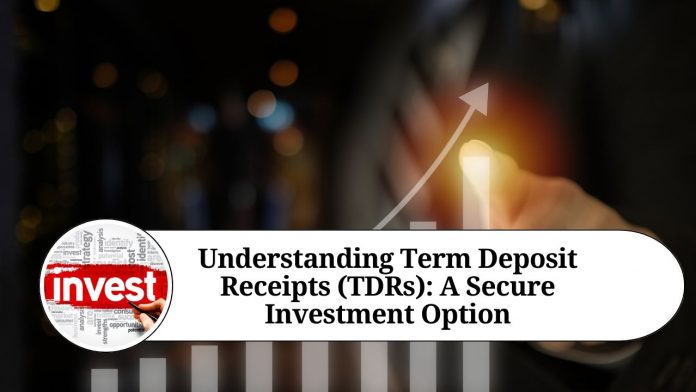INTRODUCTION
A term deposit receipt (TDR) is a type of investment product offered by banks and financial institutions. It is a fixed-term investment where the investor deposits a sum of money for a predetermined period of time and receives a fixed rate of interest on their deposit.
The interest rate on a TDR is generally higher than that of a savings account, as the investor is committing their funds for a set period of time. The term of a TDR can range from a few months to several years, depending on the investor’s preference and the terms offered by the financial institution.
One of the primary benefits of a TDR is its safety and security. Unlike other investment products such as stocks and mutual funds, the principal amount invested in a TDR is not subject to market volatility or fluctuations. The investor is guaranteed to receive the principal amount along with the agreed-upon interest rate at the end of the term.
TDRs are also a good option for individuals who want to earn a fixed income from their savings without taking on too much risk. Since the interest rate is fixed, investors can plan their finances accordingly and know exactly how much they will earn on their investment.
Another advantage of a TDR is that it can be used as collateral for loans. Financial institutions are more likely to lend money against a TDR since it is a secure investment product.
It is important to note that TDRs usually come with penalties for early withdrawal. If an investor needs to withdraw their funds before the end of the term, they may have to pay a penalty fee or forfeit a portion of the interest earned.
Before investing in a TDR, it is important to shop around and compare the interest rates offered by different financial institutions. It is also a good idea to read the terms and conditions carefully and understand the penalties for early withdrawal.
TDRs are often used by individuals who have a lump sum of money that they do not immediately need but want to earn interest on. For example, someone who has received an inheritance or a large bonus may choose to invest in a TDR for a few years to earn a fixed rate of return.
Financial institutions also offer TDRs to corporate clients and institutional investors. These clients may have larger sums of money to invest, and TDRs can provide a secure and predictable return on investment.
In addition to fixed-rate TDRs, some financial institutions also offer variable-rate TDRs. These products offer a fluctuating interest rate that is tied to an external benchmark such as the prime rate or the LIBOR. Variable-rate TDRs may offer higher returns than fixed-rate TDRs, but they also come with more risk as the interest rate can fluctuate.
TDRs are insured by the Federal Deposit Insurance Corporation (FDIC) up to $250,000 per depositor per institution. This means that if the financial institution that issued the TDR were to fail, the investor would be protected up to that amount.
In some cases, investors may choose to reinvest the interest earned on their TDRs. This is known as compounding and can lead to higher returns over time. For example, if an investor reinvests the interest earned on a 2-year TDR with a 2% interest rate, they would earn interest on both their initial investment and the interest earned in the first year.
Conclusion
In conclusion, a TDR can be a safe and reliable investment option for individuals and organizations looking to earn a fixed rate of return. While they may not offer the highest returns compared to other investment products, they provide stability and security that can be beneficial for those looking to preserve their capital. Before investing in a TDR, it is important to understand the terms and conditions and to compare rates from different financial institutions to find the best option for your needs.
Frequently Asked Questions (FAQs)
Q.What is a Term Deposit Receipt (TDR)?
A TDR is a type of investment product offered by banks and financial institutions. It is a fixed-term investment where the investor deposits a sum of money for a predetermined period of time and receives a fixed rate of interest on their deposit.
Q.How long is the term for a TDR?
The term for a TDR can range from a few months to several years, depending on the investor’s preference and the terms offered by the financial institution.
Q.How is the interest rate on a TDR determined?
The interest rate on a TDR is generally higher than that of a savings account, as the investor is committing their funds for a set period of time. The interest rate is determined by the financial institution and is typically based on market conditions and the length of the term.
Q.Is a TDR safe and secure?
Yes, TDRs are generally considered to be safe and secure investment products. The principal amount invested in a TDR is not subject to market volatility or fluctuations, and the investor is guaranteed to receive the principal amount along with the agreed-upon interest rate at the end of the term.
Q.Can I withdraw my funds before the end of the term?
Yes, but there may be penalties for early withdrawal. If an investor needs to withdraw their funds before the end of the term, they may have to pay a penalty fee or forfeit a portion of the interest earned.
Q.Are TDRs insured by the FDIC?
Yes, TDRs are insured by the Federal Deposit Insurance Corporation (FDIC) up to $250,000 per depositor per institution. This means that if the financial institution that issued the TDR were to fail, the investor would be protected up to that amount.
Q.Can I reinvest the interest earned on my TDR?
Yes, in some cases, investors may choose to reinvest the interest earned on their TDRs. This is known as compounding and can lead to higher returns over time.
Q.How do I choose a TDR?
Before investing in a TDR, it is important to shop around and compare the interest rates offered by different financial institutions. It is also a good idea to read the terms and conditions carefully and understand the penalties for early withdrawal.




















